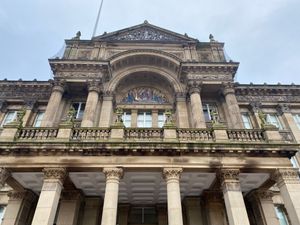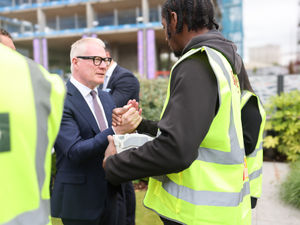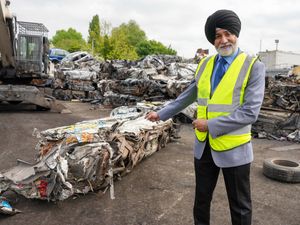Fearful in defeat, jubilant in victory: MPs on return to Westminster
Two MPs from our region – and two very contrasting emotions as politicians prepare to get back to work in Westminster.
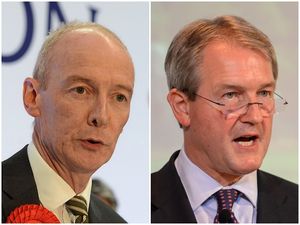
We hear from MPs preparing to head back to the House of Commons after the Christmas break as the dust settles in Westminster following the bruising General Election campaign.
Labour MP Pat McFadden
Labour heads into 2020 powerless to stop Boris Johnson from pushing through his vision for Britain, MP Pat McFadden has said.
Mr McFadden, who is now the sole Wolverhampton Labour MP after the party’s disastrous election performance, said the mood was understandably bleak among Parliamentary colleagues preparing for an extended spell in opposition.
He also suggested many feel betrayed by Jeremy Corbyn for agreeing to the election in the first place, which resulted in Labour losing 60 seats and handed the Prime Minister a handsome majority.
Whereas before Labour could make things tricky for a Government that didn’t have a majority, the arithmetic now means Labour is helpless and its opposition will now only take the form of a protest vote.
It is back to the drawing board for the party which must once again start afresh and seek to convince the public they can be taken seriously as a political force.
And key to that, says Mr McFadden, will be choosing the right leader. While refusing to denounce any of those in the running by name he said selecting a “continuity Corbyn” candidate would spell disaster for Labour. Rebecca Long-Bailey is seen as the most closely aligned to Mr Corbyn and has the backing of many of his supporters.
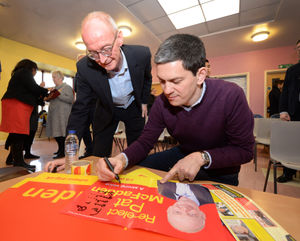
Mr McFadden, who served as a minister under Gordon Brown, said: “We’ve had a disastrous election result, the worst since 1935. So it’s no surprise when the Labour Party has been on the end of such a defeat – we have lost a number of seats in the Black Country and the mood is pretty bleak.
“One thing to remember is that most MPs didn’t want Jeremy Corbyn to agree to the election. Election speculation was bubbling from the moment Boris Johnson went into Number 10 in July and MPs overwhelmingly did not want Jeremy Corbyn to agree to the election on Boris Johnson’s terms.
“To agree against the wishes of the vast majority of his MPs was terrible mismanagement. A majority of 80 gives the Prime Minister a free hand to pursue the things he wishes. There is no point trying to deny that. It’s the biggest Tory majority since the 1980s. There will be Parliament votes but the Parliamentary arithmetic as it is, the majority he has got, gives him control to pursue whatever course he chooses.”
Mr McFadden said Labour MPs would have to take the defeat on the chin but believes the last few years under Mr Corbyn’s leadership have been a missed opportunity.
He said: “In politics you win or you lose but the frustrating thing is this was this was the wrong leader with the wrong programme, and that was reflected at the ballot box. That was what voters said on the doorstep time after time.”
The MP said there now needed to be big changes if Labour is to convince voters it can be trusted. He said: “I think to carry on in the same vein with a new face and a new voice would be the biggest mistake we could make right now. We have put ourselves on the wrong side of patriotism. People didn’t believe Jeremy Corbyn believed in the UK.
“Individually there were some good policies but the programme did not stick out in voters’ minds.
“The culture has to change. It has been far too factional far too sectarian and in places nasty.”
He added: “Anyone who is a continuity Corbyn candidate is the wrong choice for Labour.
There is talk at the moment of 10 years out of power or 15. That may be true but it isn’t necessarily true if we recognise the degree of change needed.”
Conservative MP Owen Paterson
It’s a good time to be a Conservative MP.
The desperate deadlock of last year’s parliament has been banished, with a government now looking ahead to being able to get on with business without frustration from an “irrelevant” Labour Party, according to Conservative MP Owen Paterson.
Mr Paterson, a former Northern Ireland Secretary, who was re-elected as MP for North Shropshire for the sixth time in December’s general election, has spoken of the change in mood at Westminster, following a landslide victory for his party leader, Boris Johnson.
The Conservative, and committed Brexiteer, said the government’s focus will now move from “cliff-edge votes” and “drama” to implementing its manifesto pledges – beginning with Brexit.
He has also had a word of warning for any members of the House of Lords who may look to frustrate the passing of Brexit legislation, insisting those elected on the Conservative manifesto would not stand for any more obstruction.
Mr Paterson said the contrast between the pre-election parliament and the one elected in December could not be more stark. He said: “The logjam was ghastly. I went down there every week thinking it cannot get worse and it did. Week after week it got worse with parliament unable to make a decision, with people on the remain side using every possible trick to frustrate the will of the people, and what is so splendid about what has happened is people have been absolutely resolute through four elections on this.
“Now at last we have got a parliament in tune with what the people wanted.”
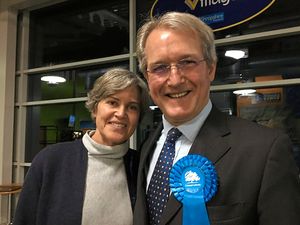
Mr Paterson said the drama of last year’s parliament will now be replaced by debate within the government.
He said: “Every week was drama, that will go now. The drama will move to within government. The big arguments will be within government.”
He added: “This will be very different, you will not have the cliff-edge votes and prima donnas promoting themselves all over the air waves.
“The priority for the Tory government is to deliver on their promises, the first is Brexit, then the NHS and infrastructure.”
There has been considerable focus on the Labour Party and its leadership after its disastrous performance in December’s election but Mr Paterson said they would have no role going forward, adding: “They have got nothing to say and most importantly they have got no role. It will be a very different Houses of Parliament and the key arguments will be within government making sure the government does the right thing.”
He also reflected on the different mood when the parties returned to Westminster, saying: “They were completely demoralised. When the front bench came in no-one was cheering, not many of them spoke and over Christmas they have turned in on themselves. They are irrelevant to everyday life.”
Mr Paterson said the prospect of more investment outside London was exciting for MPs in the Midlands. The idea has been raised with suggestions that the Treasury may change a formula used for assessing investment, which critics claim is heavily weighted towards London.
He said: “The possible changes to the treasury formula, that is really interesting and could make a huge change.
“I have sat here 200 miles from London over 20 years as an MP continually on about the lack of understanding of life in rural areas by the London-centric civic service. That will change radically.”
Looking to the future Mr Paterson said he expected investors to now start putting money into the UK – no longer put off by Brexit uncertainty or a possible Corbyn government.
He said: “I think a lot will happen. There is an attractive country to invest in and I think a lot of foreign investment will start coming in.
"It is vital we carry on next week, get through this bill in the Commons, and if we get any whiff of trouble from the Lords there will be no sympathy from the new MPs.
“I would hope to see a large number of infrastructure projects take off because people are not frightened of a Corbyn government.
“I think you will see a large amount of government investment and then we can go further down the route of getting 80 per cent of trade covered by free trade deals, that will just make it much better to invest here so I guess the immediate thing is people will be better off.
"That will then generate tax revenue and we can press on with what are very ambitious infrastructure plans.
"Here we can push on with Future Fit, which will be the biggest investment ever by the state in health in Shropshire.”
Lib Dems looking for 'meaningful role to play'
The Liberal Democrats have pledged to hold the Tories to account despite a disastrous showing in the general election.
The party won just 11 seats and is looking for a new leader after Jo Swinson was defeated, as voters emphatically rejected its anti-Brexit message.
But according to Ian Flynn, a campaigner in the Midlands, the Lib Dems still have a key role to play in scrutinising Boris Johnson’s new government.
He said: “The Liberal Democrats, both locally and nationally, will be watching closely the new Conservative administration.
“We will be holding it to account on issues such as promised investment for the Midlands, an end to the housing and homelessness crisis, and proper funding for public services including the NHS, education and policing.”
Mr Flynn stood as a candidate in Dudley North, coming third on 3.3 per cent of the vote as the Tories took the seat for the first time ever.
The Lib Dems had hoped to gain seats, but acting leader Sir Ed Davey described his party’s election performance as “deeply depressing”. The party will now regroup with a new leader to choose.
Brexit Party ‘changed the narrative’
No seats in Parliament but a major impact on the result – that’s the post-election view from Brexit Party activists in the West Midlands.
They claim that while Nigel Farage failed to send a single MP to Westminster, his party succeeded in “changing the narrative” in the general election, helping the Tories to gain the majority required to deliver Brexit.
Candidate Andrew Garcarz, who came last of five in Birmingham Ladywood with 1.9 per cent of the result, said the Brexit Party’s strong performance in May’s European elections had worried the Conservatives.
“In the general election our candidates were unsuccessful in terms of winning seats, but that was never the issue,” added Mr Garcarz, who was also a party organiser in Staffordshire.
“We changed the narrative and ended up taking votes from the Lib Dems in the south and Labour in the Midlands and the north.
“As a party, we were effective in influencing people’s opinions, and that’s what got the Conservatives their majority.”
The Brexit Party underwent a testing start to the campaign when Mr Farage pulled out 317 candidates in Tory held seats after initially pledging to stand all across the country.
Mr Garcarz says the move “took away the initial impetus” in the campaign, but said things got back on track once expectations were managed.
“Some candidates obviously felt aggrieved when they were pulled out, but we should never have told 600 people they had a chance of winning in the first place,” he said.
“Expectations were raised too high, and I think we needed to be more realistic about what we could actually achieve.”
Mr Farage says there was “much to celebrate” about the Brexit Party’s election performance, although he has yet to confirm his next steps. He has said it could be transformed into the Reform Party, adding: “It’ll have to campaign to change politics.”



